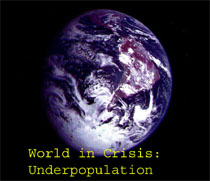International population advocates and their allies in the media have decided that October 31, 2011 is the day that the world’s population will reach 7 billion. How convenient for them; they get to play off the day dedicated to spooky tales with a spooky tale of their own.
Over the weekend, some version of the Associated Press (AP) article “World Population Nearing 7 Billion” ended up in most major newspapers. Here’s the gist of the article: Women and their families living in poverty, not enough food, water, or access to education – all because they have too many children. The intended message? The world is going to collapse under the weight of its burgeoning population unless something is done.
 United Families International has been contacted by several individuals asking for a rebuttal to this claim. So we decided to share some thoughts on the topic.
United Families International has been contacted by several individuals asking for a rebuttal to this claim. So we decided to share some thoughts on the topic.
Is the world’s population spiraling out of control?
No, global fertility rates are half of what they were in 1970 and are continuing downward. The number of children the average woman has during her childbearing years fell from five in the mid-1960’s to 2.7 today. With the exception of some sub-sarahan nations such as Niger, Yemen and Uganda, fertility rates have fallen rather dramatically around the world. (UN, World Population Report, 2010) By 2020, for the first time, the global fertility rate will dip below the global replacement rate of 2.1.
Currently 79 countries, representing close to 50 percent of the world’s population, have below-replacement fertility rates. No industrialized nation still produces enough children to sustain its population over time or to prevent rapid population aging. It is counterintuitive, however, because even in areas where birthrates are dramatically below replacement level, the absolute number of people is often still growing–giving the appearance of rampant population growth.
If fertility rates have fallen, why have world population numbers continued to rise?
It’s because of a process called “population momentum.” A simple definition is that there are enough women, already born, who will probably bear children that the world’s population will continue upward for a period of time. But what the population control advocates don’t address is what happens when the population momentum stops and population growth rates become negative and eventually go into a steep free fall.
Population free fall is happening in some countries right now. When a country reaches a total fertility rate of 1.4, that country will lose one-third of its population every generation. There are approximately 34 countries that are in that predicament right now. Our colleagues at Population Research Institute (PRI) have put together a short, clever cartoon video that explains such things as population momentum. See it here.
Is the rise out of poverty predicated upon reducing family size?
Try though they might, the international agencies that support population control have not been able to support their assumption that reducing family size boosts development or provides a sure rise out of poverty.
You’ll note that even in the AP article Lester Brown, an environmentalist that always makes sure he’s in the news, is quoted as saying: “Extreme poverty and large families tend to reinforce each other.” [emphasis added] He offers this equivocating statement because there is no empirical support for the position that reducing fertility pulls a country and its people out of poverty.
It is said that modernization and development are “the best contraceptive.” As modern technologies and economic development have gained traction in developing countries, birth rates have fallen – with or without inducements to reduce family size. To say “you won’t pull yourself out of poverty until you curtail your children” is simply unsupportable. Here’s an interesting chart; take a look and you decide: Statistics on Population and Prosperity: Is There an Effect?
Secondly, you’ll want to see another of PRI’s cartoons. It gives you “A New Way to Look at Population and Poverty.”
Why are there people in the world that are still hungry?
“There is enough food in the world today for everyone to have the nourishment necessary for a healthy and productive life.” – World Food Program.
“The world currently produces enough food for everybody, but many people do not have access to it.” -Food & Agriculture Organization of the UN.
The distribution and access to food is hampered by many things other than poverty, such as natural disasters, ineffective farming techniques and over-exploitation of land, poor infrastructure for delivery, and war. One of the biggest reasons people go hungry is because of ineffective and/or corrupt government. There is no reason to believe that reducing the number of children is going to have a major impact on the factors that are the primary drivers of world hunger. To see a list of statistics regarding population and food production, go here. You’ll also see another short, yet great PRI video: “Food: There’s lots of it.”
Conclusion
The problems in some countries are serious and deserve our full attention. The millions upon millions of dollars spent on population control programs, however, are better spent on such things as providing clean water, sanitation, modern medical care, education, infrastructure, and economic development.
Seven billion is a very large number. But throwing it into the population debate without any context, intentionally takes the personal nature out of the life equation. Each of those seven billion is a life of significant value and influence. American genius Walt Disney once said, “Our greatest natural resource is our children.” We trust that human ingenuity will enable mankind to meet the challenges ahead and we welcome each and every child into the world.
Happy Birthday, young seven billionth wonderful child!
LifeNews.com Note: Carol Soelberg is the president of United Families International.







